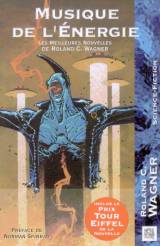|
When my first short story collection, THE LAST HURRAH OF
THE GOLDEN HORDE, was published in 1970s, Algis Budrys, one of the most
important critics in the sf field at the time, wrote a review. It said, in
effect, "these are some very good stories, but when is Spinrad going to
develop a consistent style?"
This review was very important to my
development as a writer. Because it was so wrong-headed. Budrys made me
realize that, yes, I did employ many different styles. But while he
saw this as a flaw, as far as I was concerned he had pointed out a virtue
I hadn't been consciously aware of.
Why shouldn't a writer employ
different styles? As far as I was concerned, there was no reason not to.
Indeed, the nature of each story should determine the style in which it is
written. The style and form should be the style of the story, not
the writer, and I consciously followed this dictum ever since.
Reading
the stories in MUSIQUE DE L'ENERGIE called this early experience of mine
to mind because, had this book been published in 1970 and reviewed by
Budrys, I'm sure he would've said the same thing about Roland C.
Wagner.
The range of stories in this book is pretty breathtaking, not
only in terms of style, but content, form, thematic material, and even
level of intent.
These days, one would hope, the literary lessons of
the past thirty years have been learned by critics and readers, and most
will understand that this is a virtue and not a flaw.
The stories in
this book range from a light humorous poem like LES TROIS LOIS DE LA
SEXUALITE ROBOTIQUE and the forthrightly scatalogical toilet humor of 20
ANS SUR UN TRONE, the retro so-called "steampunk" (a terrible misnomer
since the story has nothing to do with "cyberpunk and little if anything
to do with steam) of CELUI QUI BAVE ET QUI GLOUGLOUTE, the more or less
straightforward sf of BLAFARDE TA PEAU, ROUGE TON REGARD, CE QUI N'EST PAS
NOMME and FRAGMENT DU LIVRE DE LA MER (which won the Prix Tour Eiffel),
through moody, lyric, experimental stories like CHAQUE NUIT, FAIRE-PART,
UN OEIL OUVERT DANS LA NUIT, and A LA SAIGNEE DU COUDE, on into the title
novella MUSIQUE DE L'ENERGIE which in some ways synthesizes many of Roland
C. Wagner's diverse styles, thematic materials, levels of intent, and
obsessions.
Sign different pseudonyms to these stories and most people
would believe they were written by three different writers, for in a
certain sense Wagner is three different writers.
There is Roland Wagner
the straightforward sf writer, enamored, even, of "space opera," writing
self-consciously in the so-called "pulp tradition," your convention-going
sincere member of the science fiction community and fandom.
Then there
is the New Wave Roland Wagner, obsessively exploring altered states of
consciousness and altered cosmological and temporal metaphysics with
matching lysergically lyric prose and outre and experimental form, who
would have been quite at home in Michael Moorcock's NEW WORLDS or the its
current heir INTERZONE.
And last, but certainly far from least, there
is Roland Wagner the Rock and Roller, who has probably written more sf
about Rock than any other writer, Moorcock and yours truly included, and
in MUSIQUE DE L'ENERGIE probably more romantically and coldly-analytically
at the same time, no mean feat.
Which is not to say that these three
Roland Wagners do not often collaborate.
HORS MONDE HORS TEMPS
may be a densely written and sometimes confusing depiction of a very
strange consciousness, but the confusion, at least for the reader, is
resolved in the end in a science fictionally satisfying
manner.
FRAGMENT DU LIVRE DE LA MER, while in some ways a didactic
"ecology" story, rises above its message because it is written in a lyric
style like CHAQUE NUIT and characterologically grounded in the mutating
consciousness of its protagonist.
CHAQUE NUIT, reminiscent in an
admirable way of Thomas M. Disch's classic THE ASIAN SHORE in its
brilliant depiction of a man lost in a city where he doesn't speak the
language or comprehend the culture, is, like the Disch story, an
inner-oriented voyage of a stranger in a thoroughly strange land, but
metamorphoses in the end into something a bit Lovecraftian and
successfully so.
And to close the circle, H.P.L. (1890-1991) is a
self-referential take on H.P. Lovecraft himself.
And probably needless
to say, the stories about Rock and Roll can hardly not deal with
chemically altered consciousness, and vise versa.
Indeed, while there
is a certain modest amount of sex in these stories, it is certainly fair
to say that Roland Wagner's two main thematic obsessions are drugs and
Rock and Roll.
In this, of course, he is not exactly alone. I've
written my share of this sort of thing and maybe more, and so have Michael
Moorcock, Maurice Dantec, John Shirley, Rudy Rucker, to name a random
sample.
But Wagner does something different.
Like Philip K. Dick,
he uses stoned states of consciousness as a literary means of exploring
cosmological mutatations, metaphysical questions, and altered states of
being, and like, say Moorcock and Rucker, with the joie d'vivre of a true
Rock and Roller and the forthright connoisseur's appreciation of good
weed, hash, or psychedelic.
But unlike Dick, Wagner is a
forthright psychedelic romantic, and yet unlike any other psychedelic
romantic, Wagner also views the destructive aspects of destructive drugs
and the subcultures they generate with a cold and knowing eye.
Philip
K. Dick was sometimes capable of this, perhaps in LITTLE HEROES so was I,
but no other writer I can think of writing today has made these two
seemingly contradictory aspects the thematic core of his ouevre and so
successfully reconciled them as Roland C. Wagner.
And certainly no one
else has so courageously and knowingly centered his exploration of this
material in such a wide and deep knowledge of the relationship between
drugs, rock, and culture, a subject most writers try to avoid as
assiduously as the plague or the narcs.
Why courageous?
Read MUSIQUE
DE L'ENERGIE.
This novella is well chosen as the title story of this
collection and not only because it is a commercially sound title. It is
the longest story in the book, it includes most of the diverse aspects of
Wagner's writing, and the title itself, which just as well could have been
L'ENERGIE DE LA MUSIQUE, not only sums up Wagner's Rock and Roll
Psychedelic Sociopolitical Metaphysics, but, in both Wagner's version and
the change I've just rung on it, points squarely to the source and core of
the writer's creativity itself.
It starts as the Mad Maxish odyssey of
a rock band through the physical, political, cultural, and psychic ruins
of a future thoroughly balkanized America, and it climaxes in the end in
an unashamed piece of Rock and Roll world-saving romanticism, and it is
also an attempt to explore and explicate a future history that Wagner has
used in many works.
But the long middle section takes place in Wagner's
"Psychosphere," a kind of pop cultural Jungian collective unconscious,
where archetypes are not eternal, but are born, live and die, influenced
by currents and events in the "outer" world of "reality," as the
inhabitants thereof are influenced by them.
Wagner's fictional band is
translated into this realm, and their odyssey continues through the
Psychophere, through the history of America from the 1950s into Wagner's
future Great Terror which destroyed the American Dream and fragmented the
United States.
But this is not conventional history.
This is history
centered on the story of Rock and Roll.
And as such it is the true
history.
You don't believe me?
Read MUSIQUE DE L'ENERGIE and let
Roland Wagner convince you.
For one thing, the middle of this novella
conveys a brief history of Rock and Roll itself in a way and on a level
which has never been done before.
It's not just that Wagner knows his
rock trivia and his chops, which he does, nor that he loves Rock and Roll,
which he does too, but that it's tough love.
Wagner demonstrates that
it was Rock and Roll which broke the cultural sterility of the American
1950s, while pointing out that it was early primitive stuff, that the
likes of Elvis and Buddy Holly had no idea of the transformation they were
unleashing, and what's more would not have taken moral responsibility for
it if they had.
He goes on to do likewise for the rise and fall of the
counterculture, given birth by the confluence of psychedelic drugs and
Rock and Roll, destroyed by speed and other bad dope and the political
power of the Establishment.
And on into the punk reaction. And
beyond.
In one of the most treachant insights, Wagner calls Michael
Jackson the first anti-rock star, the node, the nexus, the key turning
point in co-opting a music of rebellion, mutation, and transformation into
just more show biz, ruled by the sacred bottom-line.
This is not only
an incredible tour-de-force, it must have taken either great courage or
great naivete to write. And Wagner herein demonstrates once more that far
from being a naif, he is the most sophisticatedly street-wise of French
science fiction writers.
It's impossible to believe he didn't know what
he was doing.
He had to have known that he was telling the true secret
history that for decades and even now American publishers wouldn't touch
with a fork. And told me so themselves.
Rock and Roll and drugs
wrote the story of America from the sleepwalking 1950s through the
countercultural 1960s and into the War on Drugs which began in the 1970s
and continues even today, poisoning the American spirit and much of the
rest of the world not merely by throwing millions of Americans into prison
and destablizing half of Latin America, but, by suppressing the very true
story that Roland Wagner tells here, turning the history that has been
written into a lie, and therefore the American Dream into a nightmare with
a void at its heart.
Perhaps it somehow took a French writer to break
through this wall of silence. After all, it took another French writer,
Alexis de Tocqueville, to write DEMOCRACY IN AMERICA in the 1800s.
It
was the Right Stuff in its time.
But of course it
wasn't Rock and Roll.
|

